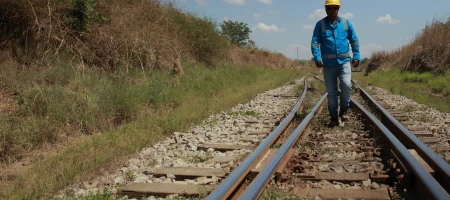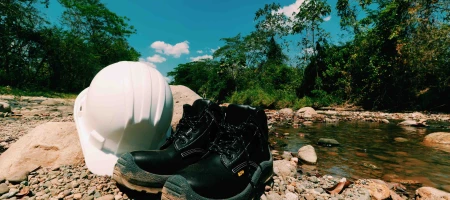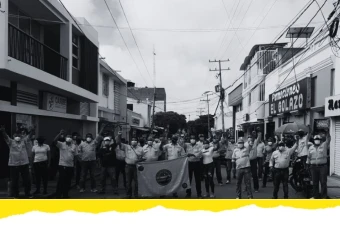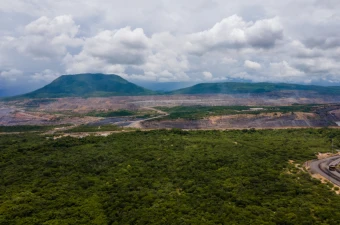
A complaint in to protect and defend miners rights in Colombia and Peru
For the first time, trade union organizations together with CNV Internationaal are filing a complaint to the EU in a quest to make visible the precarious working conditions in mines in Colombia and Peru that produce coal and metals that play a crucial role in European Unions energy supply. “Our aim is to have the European Union work with both countries to achieve compliance with the sustainability Chapter of the Trade Agreement", explains Elles van Ark, managing director of CNV Internationaal, who will be presenting the complaint.
On May 17, 2022 on behalf of mining unions Sintracarbón, Sintracerrejón from Colombia and Sindicato de Trabajadores Mineros Metalúrgicos de Andaychagua Volcan Compañía Minera from Peru, Elles van Ark, together with Ana Catalina Herrera, CNV Internationaal's representative in Colombia, will be presenting a complaint before the Single Entry Point of the European Commission. Only since last year, this complaints system been established where workers can report violations of the sustainability agreement, including labour rights violations.
Read the complaint filed with the SEP here➙
Subcontracting
One of the key issues in this complaint is the evident gap in both countries in terms of labor conditions of subcontracted workers compared to those hired directly by mining companies. The difference is significant, both in terms of job stability and wages. A study commissioned by the Friedrich Ebert Foundation (FES)2 on coal mining in Colombia reveals that outsourced workers work under short-term contracts, from 3 to 6 months to 1 year, without any social benefits. They work longer hours and earn 30% less.
The objective of the complaint of the mining unions focusses is to make visible violations and anti-union practices in Colombia and Peru, practices that are a breach of the sustainability chapters of the international trade agreements signed between both countries and the member states of the European Union.
Social sustainability in EU-Trade Agreements
This complaint highlights the fact that the governments of Colombia and Peru are not fullfulling key social sustainability provisions of the trade agreement that both countries have with the European Union. This violations occur in the context of a crucial energy transition in which coal is playing an important role and metals are positioned in the future as the primary source of energy sustainability. It is urgent that at this time, the international rights guarantor entities turn their attention to these inconsistencies.
Furthermore The complaint reveals a pattern of anti-union acts and the misuse of subcontracting, which leads to the violation of workers' rights to freedom of association, collective bargaining and, therefore, discrimination against subcontracted workers performing the same work as direct employees.
These precarious working conditions and anti-union practices have been occurring for several years in the mines of both countries that are owned by Glencore (Swiss multinational) and that export coal, in the case of Colombia, and zinc, copper, tin, silver and lead in the case of Peru, directly to EU Member States.
Subcontracting: the big labour rights gap
One of the key issues in this complaint is the evident gap that persists in both countries in terms of labour conditions of subcontracted workers compared to those hired directly by mining companies. The difference is significant, both in terms of job stability and wages. A study commissioned by the Friedrich Ebert Foundation (FES)2 on coal mining in Colombia reveals that outsourced workers work under short-term contracts, from 3 to 6 months to 1 year, without any social benefits. They'd work longer hours and earn 30% less.
Freedom to organize
Another crucial aspect in this dispute over labor rights has to do with the limitations faced by subcontracted workers on the right of association and collective bargaining.
According to a survey in Peru, 46.3% of respondents indicate that their contracts are not renewed because of union participation and that their contracts are conditional on not joining a union. In addition, 63% feel hostility ostile towards union membership and 49.6% indicate that they are not covered by a collective bargaining agreement.
In both Colombia and Peru there are measures approved by law that, in theory, protectguarantee the rights of subcontracted workers. Unfortunately these laws are not put into practice due to Not so the application of these laws, since the real problem is the a lack of application and sanctioning of non-compliance with these lawsem.
Mitigating impact
The filing of this complaint by CNV Internationaal seeks on the one hand to make visible the breaches of international agreements, especifically Chapter IX of the Trade Agreement between Colombia and Peru and the European Union, regarding sustainability. On the other hand, it raises the need to mitigate these breaches, introducing a Road Map that tracks the impact of labour subcontracting and precarious contracts in the two countries. The complaint addresses the responsibility (including through mandatory human rights due diligence) of all business actors involved in relation to subcontracted workers.
Just energy transition
Regarding the global energy transition, it is essential that European countries importing minerals extracted in Latin America's n minesing, demand compliance with the laws that protect the rights of workers, That's the only way so that this transition is finally can be a just transition.
Together with mining unions from Colombia CNV Internationaal initiatied an online labour observatory, that specializes in monitoring and sharing promoting just energy transition issues. Through continuous sharing of useful information, such as tools, cases, videos, stories and news we’re supporting and promoting social dialogue processes in Latin America.
SEP
The Single Entry Point is the first point of contact for all EU stakeholders who are facing potential trade barriers in third countries or who find non-compliance with sustainability rules related to Trade and Sustainable Development or the Generalised Scheme of Preferences EU trading partners.
Publication date 20 05 2022



